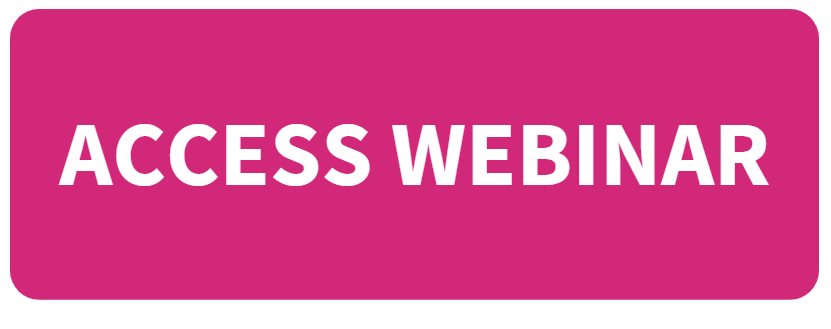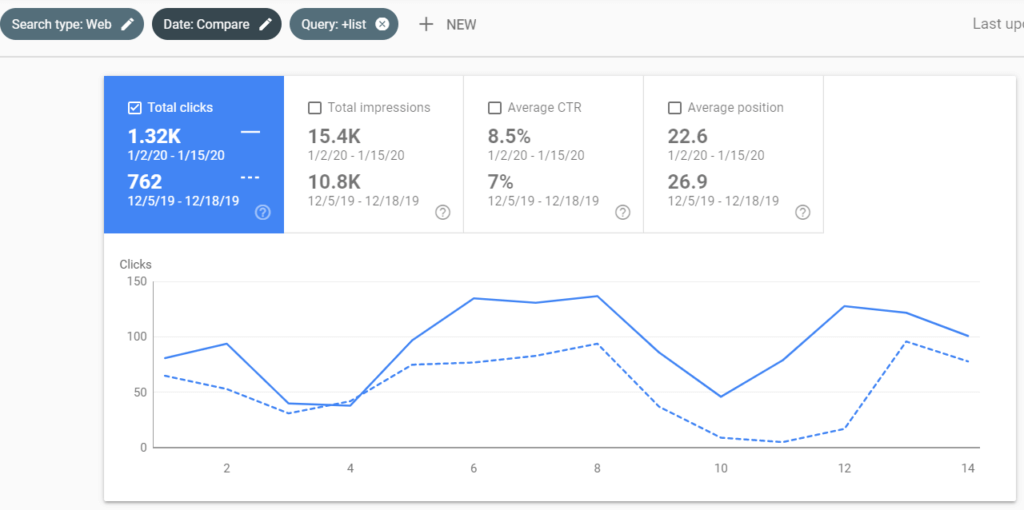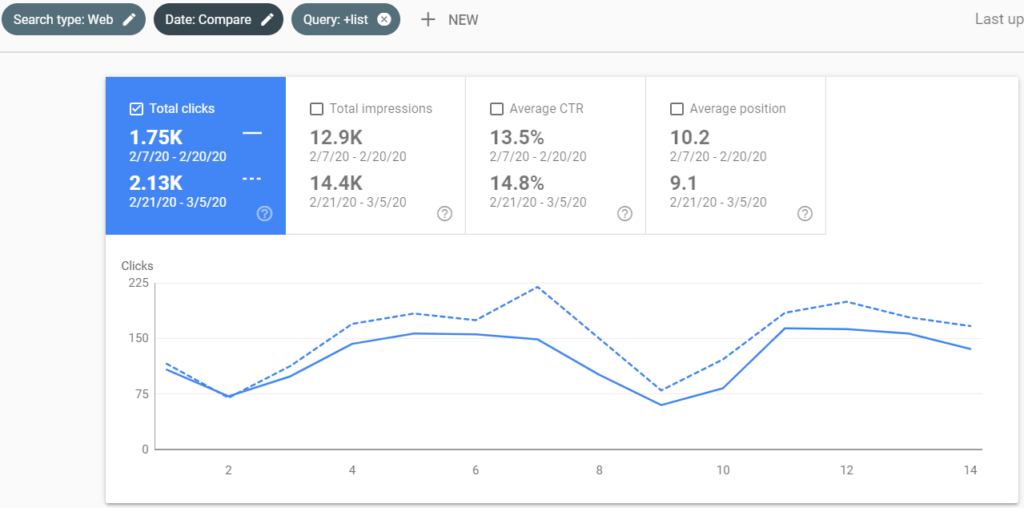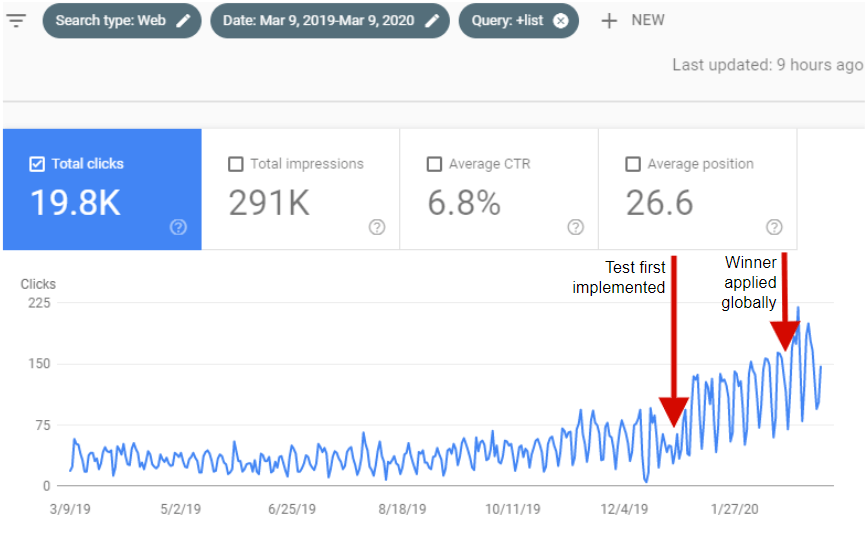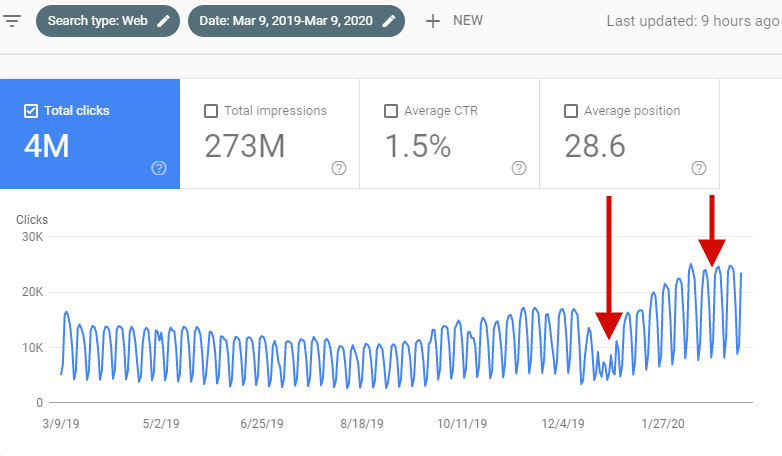Title Tag Tests: A TrustRadius SEO Case Study
Summary
-
- Conducting on-page SEO tests can be a low-effort, high-impact strategy to grow website traffic.
- Title tag and meta description tests are two examples of on-page SEO tests that can improve CTR and help lift traffic.
- Tracking results of title tag tests can be done in Google Analytics and Google Search Console using custom segments and filters.
- A title tag test across one major page type on the TrustRadius website led to 22% growth in sitewide traffic after implementing the winner of the test.
“The SEO industry is like magic.” “SEO work is a complete mystery.” I’ve heard these comments before and while I understand where they come from, I would like to remind everyone that at one point in time science was considered pure wizardry.
What I would like to personally recommend to my fellow SEOs to help dispel these myths that the SEO industry is a black box of mystery is to get into the practice of testing and tracking with data, acting on those test results, and sharing those results—the good and the bad—with your team, your company, or your clients. The example below is one of many on-page tests you can perform that is low on effort and potentially high on impact.
As the Technical SEO Manager at TrustRadius, one of the core functions of my job is to conduct on-page SEO experiments and analyze, track, and report experiment KPIs. Title tags are one of the most important on-page SEO elements to test because your title tag is typically the first thing a potential visitor will take notice of when performing a search.
Like any good test it starts with a hypothesis.
Hypothesis: Updating our title tags to include keywords users search for when looking for the type of content on our category pages will increase CTR.
Results: 22% growth in clicks sitewide after implementing the winner of the title tag test to all pages.
Research Title Possibilities
A major page type on our site that is likely familiar to many who work on e-commerce and directory sites is our category pages. These pages all have similar keyword query templates (e.g. [software category] list, [software category] reviews, best [software category], etc.). I used a combination of SEMRush and Google Search Console to perform keyword research on the types of keyword modifiers most commonly used to find our category pages. You should also check out keywords that competitor sites use as modifiers for similar pages on their websites.
When researching which modifiers are most commonly associated with these major page types, I found some themes around the use of “best”, “top”, and “list of top”—these all had high impressions and clicks to our category pages according to Google Search Console.
This gave me the idea to test modifying our standard category page titles to include some of these common keyword modifiers with the hope that it would increase the CTR to these pages. I also noticed none of our major competitors were using the particular keyword modifiers I chose to test, meaning this change might help differentiate our results in the SERP.
How to Set Up a Title Tag Test to Improve CTR
I exported the category page URLs with the highest volume of sessions in the past 30 days from Google Analytics. I started numbering each URL in the list with 1, 2, or 3 and continued to do this down the entire list to get three groups of category pages with roughly the same amount of traffic in each group.
When the first test began on 1/2/2020, the groups consisted of
- 1 control group of 20 URLs with original title tags unchanged
- 1 test group of 20 URLs which had titles changed to the format of “Best [category name] [current year]”,
- 1 test group of 20 URLs which had titles changed to the format of “List of Top [category name] [current year]”
This test ran until 1/30/2020. I was able to quickly see results for both of the test groups of URLs.
How to Track Results of Title Tag Tests
In Google Analytics I set up custom segments to track the trend of the specific URLs – one for each of the three groups – to include all landing pages, organic traffic only.
I quickly saw the results of both of the test groups of URLs breaking away from the control group in terms of total organic traffic over time. Because group 3 with its modifier of “List of Top” was shown as the winner from these initial results, on 1/30/2020 I decided to change group 2 to “List of Best” to see if the “List of…” modifier was correlated with the highest CTR increase. After that test ran for two weeks, group 3 was still the clear winner in terms of CTR and total traffic to those category pages even after changing group 2 to include the “List of Best” modifier.
Based on those results, I decided to move forward with globally updating all of our category pages with the winning modifier—“List of Top”, which was implemented by our engineering team on 2/24/2020.
Our competitors target different keyword modifiers in their category page title tags or do not target any modifiers at all but rather keep the category name very straightforward, so this gave our pages a chance to differentiate in the SERP.
I’m fortunate to have dedicated developer resources at our company that are readily available to do SEO changes on our website. The implementation of the title tag test was done by me. We have a custom CMS for most of our major page types on our website and for our category page we have the ability to override the default title tag that is universally coded. I could have also done this title tag test using Optimizely but since it was easy for me to go in our custom CMS admin and change each of the category titles one by one without having to use developer time, that was my somewhat scrappy approach. Once the winning title tag was chosen, I had our developers update the title tag template across all category pages on our website.
Because all of our category pages are included in our sitemap and these are pages that already get a regular, healthy amount of traffic daily, they are already primed to be crawled frequently so I didn’t feel the need to submit each URL into Google Search Console for reindexing. The title tags updated fairly quickly in the SERP on their own.
Reporting Results of Title Tag Tests
Below you can see the growth in clicks to pages with “list” in the query after the test with all title tag variations was started on 1/2/2020 and the two weeks afterward compared to a similar time period in December 2019. That is 73% growth to some of the highest value pages on our website.
After the test results were in and the title tags were changed globally on all of this specific page type to be of the variation “List of Top…” on 2/21/2020, you can see the continued growth of clicks to these pages. Below you can see 22% growth in a two-week time period after the titles were changed globally.
Here’s another look over a longer time period. The title tag test was implemented on 1/2/2020. The winner of that test was implemented across the entire site on 2/21/2020. The graph below shows the trend line of clicks in the past year including the keyword query “list”.
The graph below shows the trend line of clicks in the past year for all queries. These trend lines encompass all of our indexed URLs on our site, not just those where we changed the title tags.
Anticipating More SEO Tests in the Future
This experiment is just the beginning of many title tag tests to come. We’ll be continuing to test titles on some of our other major pages and updating title tags on filtered (URLs with parameters) pages. By looking at queries that drive users to our filtered pages using Google Search Console we can see those filter options that could benefit from a change in title tags in order to increase CTR.
At TrustRadius and across the SEO industry, the foundational principles of the scientific method are alive and well. A 22% growth in organic clicks to our overall website is nothing to shake a stick at. Simple tests like this can lead to huge growth in traffic, and we’re committed to doing more of them in the future.
For more SEO success stories at TrustRadius, tune in to a free webinar with Mark Barrera, our Senior Director of SEO. On May 13, 2020 at 12:00 CST he’ll discuss all the details on how our team grew TrustRadius traffic more than 3X sitewide in the past six months. Register for free or access the event on-demand with the link below:
